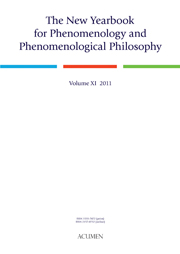Book contents
- Frontmatter
- Contents
- Articles
- Husserl and the Mind–Body Problem
- Phenomenological Kaleidoscope: Remarks on the Husserlian Method of Eidetic Variation
- Husserl and McDowell on the Role of Concepts in Perception
- Edmund Husserl's Europe: Borders, Limits and Crises
- The Ontological Status of Essences in Husserl's Thought
- Heidegger on Understanding One's Own Being
- Discussion
- In Review
- Conclusion
Husserl and the Mind–Body Problem
from Articles
- Frontmatter
- Contents
- Articles
- Husserl and the Mind–Body Problem
- Phenomenological Kaleidoscope: Remarks on the Husserlian Method of Eidetic Variation
- Husserl and McDowell on the Role of Concepts in Perception
- Edmund Husserl's Europe: Borders, Limits and Crises
- The Ontological Status of Essences in Husserl's Thought
- Heidegger on Understanding One's Own Being
- Discussion
- In Review
- Conclusion
Summary
Abstract: The aim of this article is to situate positively Husserl's philosophy with respect to current discussions concerning the mind–body problem and, more specifically, the so-called “hard problem” of consciousness. It will be first argued that the view according to which phenomenology can contribute to the solution of the hard problem by being naturalized and incorporated into cognitive sciences is based on a misunderstanding of the nature and aim of Husserl's philosophy. Subsequently, it will be shown that phenomenology deals with the issue of the relation between mind and body in the framework of the transcendental foundation of the ontology of animal nature, and provides thereby a non-reductionist solution to the hard problem. This discussion will at the same time stress the sharp differences existing between phenomenology and philosophy of mind, and highlight the relation between phenomenology and ontology.
Keywords: consciousness; mind; body; Edmund Husserl; ontology; foundationalism.
Introduction
This article is about the relation between the mind and the body from the standpoint of Husserl's phenomenological philosophy. The title evokes the current debate within analytic philosophy and its terminology, which will provide a term of comparison for this study. However, clarifying Husserl's position on the mind– body problem is a matter of interest not only in view of a confrontation with analytic philosophy, but also in order to situate the phenomenological account of human nature with respect to both ancient and modern metaphysical conceptions of it.
- Type
- Chapter
- Information
- The New Yearbook for Phenomenology and Phenomenological PhilosophyVolume XI 2011, pp. 1 - 15Publisher: Acumen PublishingPrint publication year: 2012



